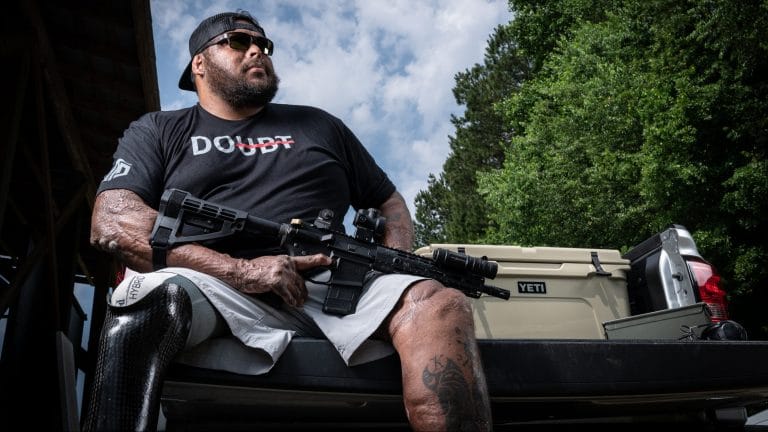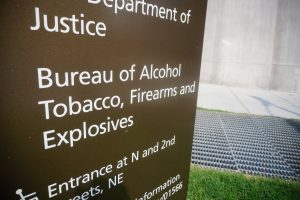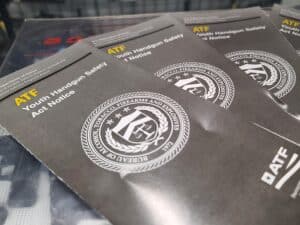The ATF can’t arrest members of the Firearms Policy Coalition (FPC) or customers of Maxim Defense for possession of unregistered pistol-brace-equipped guns, according to a new federal court order.
A three-judge panel on the Fifth Circuit Court of Appeals issued a new clarification on Friday of its earlier injunction against enforcement of President Biden’s pistol-brace ban. The court sided with FPC’s reading of the injunction and said the order extends to all members of the gun-rights group as well as people who bought braced guns from fellow-plaintiff Maxim Defense.
“This clarification is granted essentially for the reasons concisely set forth in the May 25, 2023, Plaintiffs-Appellants’ Reply to Their Opposed Motion for Clarification of Injunction Pending Appeal,” the court wrote in Mock v Garland. “There, the appellants acknowledge that ‘[a]lthough a nationwide injunction would have functionally addressed the question of scope, on which Plaintiffs now seek clarity, Plaintiffs understand that one was not given . . . . Instead, Plaintiffs merely request clarification on whether their reading of the term ‘Plaintiffs’ to include the customers and members whose interests Plaintiffs Maxim Defense and Firearms Policy Coalition (‘FPC’) have represented since day one of this litigation is correct.’ That reading is correct. Also as requested, the term “Plaintiffs in this case” includes the individual plaintiffs’ resident family members.”
The ruling establishes that the injunction, issued just days before the deadline to register braced guns or face potential federal felony charges, is meant to be read in the most expansive way possible. That may directly impact a second injunction against the ban issued by a federal district judge yesterday, which was worded in the same way as the panel’s order. That increases the difficulty the ATF will have in trying to enforce its new rule since scores more people will be immune from prosecution as the case proceeds.
The issue stems from Biden’s decision to try and reclassify pistol-brace-equipped guns as short-barrel rifles and shotguns, subject to the rules of the National Firearms Act of 1934 (NFA). That left millions of owners with the options of either dismantling, destroying, or registering their guns by the end of this month. Anyone who refuses to comply could be subject to federal felony charges for possessing an unregistered NFA item.
As soon as the rule was finalized, numerous gun-rights groups filed suit against the rule. They challenged its constitutionality under the Second Amendment, arguing the guns are protected because they are in common use for lawful purposes. And they also challenged the authority of the ATF to reclassify the braced firearms without new legislation from Congress under the Administrative Procedures Act, a legal strategy that has borne fruit in challenges to the bump stock ban.
Cody J. Wisniewski, a senior attorney at FPC, said the clarification confirms the ATF will be severely limited in how it can try to enforce the ban while the court cases against it play out.
“We’re incredibly excited to report that the Fifth Circuit has clarified that our injunction covers FPC’s members and Maxim Defense’s customers, as we have always argued for,” he said in a statement. “This relief will offer protection while we continue to fight against ATF’s overreach.”
The panel’s order also noted it would not go beyond issuing an injunction for plaintiffs directly named in or implicated by the case because that “arguably would be tantamount to a nationwide injunction.” The order explained the panel was not unanimous in its decision either.
“One member of the merits panel would not clarify the motion panel’s order to extend the injunction to ‘customers,'” the court wrote in a footnote. “The motion panel’s injunction was limited ‘to the Plaintiffs in this case.’ There is no authority in the motion panel’s order to extend the injunction to an infinite number of non-parties to this case on the theory that, for full relief to be afforded to the plaintiffs, the plaintiffs must be permitted to sell products to an undefined set of downstream purchasers. Full adversary briefing will assist us to confirm our court’s equitable powers under the Constitution.”
The court reiterated that the injunction and its scope do not reflect where the panel might come down on the merits of the case against the brace ban.
“Nothing in this order is to be construed as a comment on the merits of any issue that this panel may ultimately address,” it wrote in the order. “The limited purpose of this clarification is to preserve the status quo ante to provide what the agency defendants term ‘complete relief’ to the parties and persons within the reasonable scope of the motion panel’s injunction pending appeal.”
The Department of Justice, which declined to comment after the initial injunction was released, did not respond to a request for comment on the clarification.







4 Responses
“The ATF can’t arrest members of the Firearms Policy Coalition (FPC) or customers of Maxim Defense for possession of unregistered pistol-brace-equipped guns, according to a new federal court order.”
This is not nearly the win you are presenting it as. It would be illegal to ask for either of these lists under the 1st Amendment. Now, all they have to do is arrest everyone anyway, let the 2A defenders self-identify, and line up an IRS audit with those 87,000 armed agents, refer them under state red-flag laws, etc.
It’s true the injunction doesn’t apply to everyone but, at least according to FPC, it applies to all of their members. So, anyone concerned about ATF enforcement of the rule could buy a membership and be included in the injunction. That’s probably true for the Second Amendment Foundation too since their injunction is similarly worded and based on the FPC injunction (though you’d probably want to ask them how they’re reading the injunction first).
The ATF has been more aggressive under Biden, so it’s possible they could pursue a unprecedented enforcement actions here. But there hasn’t been any indication they plan to do that yet. It’s more likely they will treat this rule the same way they did the bump stock ban and use the charge as a tack on to other more serious crimes.
Additionally, while these injunctions aren’t a ruling on the merits, plaintiffs has to show they were likely to win on the merits. So, given the expidited schedule the court is working on, I’d expect a ruling against the brace ban on the merits in the next few months.
And, while the injunction doesn’t technically stop enforcement against everyone, I think the ATF will be far less inclined to pursue brace charges anywhere as the court works through the case. The bigger danger brace owners face is that these injunctions only block enforcement, they don’t push back the registration amnesty deadline. If the ATF prevails in the end, anyone who didn’t register by June 1st will still be in legal jeopardy.
So, any brace owner who thinks the ATF will win and wants to comply (I believe many don’t want to comply on principle) should do so before June 1st. Personally, I think the rule is unlikely to survive these court challenges. But everyone has to weigh the risks for themselves.
FPC is more exposed on the issue of associational standing and how, if at all, that standing flows through to its “members.” This is an issue that has not been extensively litigated, mostly because it hasn’t mattered: courts have previously been more than willing to enter nationwide injunctions. And until recently, most membership associations had more traditional structures where mutual rights and responsibilities bound the association to its members. Also, in the instant case, ATF didn’t raise the issue of member standing until after the Fifth Circuit entered this current injunction.
Maxim Defense’s customers present a similar issue, although their relationship is arguably far more concrete that of FPC and its “members.” One judge on the Fifth Circuit panel objected to extending relief to Maxim’s customers because it would amount to “selling” standing. The same objection would of course apply to FPC.
Expect to see much more litigation on this issue in the near future.
That’s a good point. There are definitely some interesting questions raised by associational standing and standing for customers. This happened in the ghost gun cases too. I think the businesses have a pretty strong case, though. If enforcement isn’t enjoined against their customers then there might as well not be an injunction at all since they’d suffer the same harm with one as without one.
But I agree this will probably be the new fight over the scope of injunctions since nationwide injunctions have fallen out of favor.